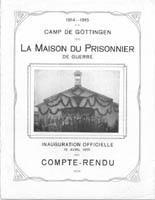Appendix 6c
Camp de Göttingen: Compte-Rendu de Inauguration Officielle de "La Maison du Prisonnier de Guerre", 15 Avril 1915
(Göttingen Camp: Report of the Official Inauguration of the "Prisoner of War Home," 15 April 1915)
 This twenty-two-page program highlights the official opening of the first YMCA War Prisoners' Aid Association during World War I in Göttingen,
Germany. This prison was located in the X Army Corps region and the opening of the YMCA hall was celebrated in high style. American YMCA
secretaries conducted intensive negotiations with belligerent governments to gain permission for the YMCA to set up welfare operations for
war prisoners. Archibald C. Harte succeeded in persuading the German government of the benefits of such welfare operations early in 1915
and the Ministry of War agreed to allow the Association to set up buildings in three prison camps, starting with Göttingen. The American YMCA
paid for the building materials, and the POW's constructed the hall in three months with the support of the German Army. The festivities
opened with a musical program by the camp's symphonic orchestra and executive choir. Foreign dignitaries who attended the inauguration
included James W. Gerard, U.S. Ambassador to Berlin, Consul Palmaroli of the Spanish embassy, and Christian Phildius, Secretary General of
the World's Alliance of YMCA's in Geneva. Harte, representing the American YMCA, delivered the opening speech. He was followed by Colonel
Bogen, the commandant of the camp and Professor Carl Stange of the University of Göttingen. Three prisoners, representing the French,
English, and Belgian POW's, each gave short addresses describing what the Association building would mean to them. The musical program
completed the dedication ceremony.1
This twenty-two-page program highlights the official opening of the first YMCA War Prisoners' Aid Association during World War I in Göttingen,
Germany. This prison was located in the X Army Corps region and the opening of the YMCA hall was celebrated in high style. American YMCA
secretaries conducted intensive negotiations with belligerent governments to gain permission for the YMCA to set up welfare operations for
war prisoners. Archibald C. Harte succeeded in persuading the German government of the benefits of such welfare operations early in 1915
and the Ministry of War agreed to allow the Association to set up buildings in three prison camps, starting with Göttingen. The American YMCA
paid for the building materials, and the POW's constructed the hall in three months with the support of the German Army. The festivities
opened with a musical program by the camp's symphonic orchestra and executive choir. Foreign dignitaries who attended the inauguration
included James W. Gerard, U.S. Ambassador to Berlin, Consul Palmaroli of the Spanish embassy, and Christian Phildius, Secretary General of
the World's Alliance of YMCA's in Geneva. Harte, representing the American YMCA, delivered the opening speech. He was followed by Colonel
Bogen, the commandant of the camp and Professor Carl Stange of the University of Göttingen. Three prisoners, representing the French,
English, and Belgian POW's, each gave short addresses describing what the Association building would mean to them. The musical program
completed the dedication ceremony.1
The text of the publication is in French, although the addresses of each of the speakers is printed in the original language with translations in French and English (Colonel Bogen and Professor Stange spoke to the assembly in German and the Belgian prisoner spoke Flemish). The publication also includes seven photographs and wood blocks of scenes in Göttingen. Although Russian prisoners were assigned to Göttingen, these men did not actively participate in the inauguration program.
Notes:
Note 1: Camp de Göttingen: Compte-Rendu de Inauguration Officielle de "la Maison du Prisonniers de Guerre," 15 Avril 1915, Göttingen, Germany: 1915. Armed Services Records Box 54, Folder: "Prisoner of War Work in Germany-1914-1915," Kautz Family YMCA Archives, University of Minnesota, Minneapolis, MN. back